#through southeast asia
Explore tagged Tumblr posts
Text
finally booked out tickets to Japan 😭😭😭😭😭😭😭
its actually happening!!!! AHHH
#ive wanted to go for forever#i almost did after graduating college but money-wise it was a no-go so i did the classic white person thing and backpacked#through southeast asia#but now that we have money AND its our five year wedding anniversary....#also on another note i have never hemorrhaged this much money before in my LIFE#if anyone has recommendations of what to do around the Tokyo area or which part is nice to make home base#i'm open to suggestions
9 notes
·
View notes
Text
Seeing fan discussions about Blue Eye Samurai and especially Mizu's identity is so annoying sometimes. So let me just talk about it real quick.
First off, I have to emphasise that different interpretations of the text are always important when discussing fiction. That's how the whole branch of literary studies came to be, and what literary criticism and analysis is all about: people would each have their own interpretation of what the text is saying, each person applying a different lens or theory through which to approach the text (ie. queer theory, feminist theory, reader response theory, postcolonial theory, etc) when analysing it. And while yes, you can just take everything the authors say as gospel, strictly doing so would leave little room for further analysis and subjective interpretation, and both of these are absolutely necessary when having any meaningful discussion about a piece of media.
With that being said, when discussing Blue Eye Samurai, and Mizu's character in particular, I always see people only ever interpret her through a queer lens. Because when discussing themes of identity, yes, a queer reading can definitely apply, and in Mizu's story, queer themes are definitely present. Mizu has to hide her body and do her best to pass in a cisheteronormative society; she presents as a man 99% of the time and is shown to be more comfortable in men's spaces (sword-fighting) than in female spaces (homemaking). Thus, there's nothing wrong with a queer reading at all. Hell, some queer theorists interpret Jo March from Little Women as transmasc and that's totally valid, because like all analyses, they are subjective and argumentative; you have the choice to agree with an interpretation or you can oppose it and form your own.
To that end, I know many are equally adamant that Mizu is strictly a woman, and that's also also a completely valid reading of the text, and aligns with the canon "Word of God", as the creators' intention was to make her a woman. And certainly, feminist themes in the show are undeniably present and greatly colour the narrative, and Episode 4 & 5 are the clearest demonstrations of this: Mizu's protectiveness of Madame Kaji and her girls, Mizu's trauma after killing Kinuyo, her line to Akemi about how little options women have in life, and the way her husband had scorned her for being more capable than him in battle.
I myself personally fall into the camp of Mizu leaning towards womanhood, so i tend to prefer to use she/her pronouns for her, though I don't think she's strictly a cis woman, so I do still interpret her under the non-binary umbrella. But that's besides my point.
My gripe here, and the thing that spurred me to write this post, is that rarely does this fandom even touch upon the more predominant themes of colonialism and postcolonial identities within the story. So it definitely irks me when people say that the show presenting Mizu being cishet is "boring." While it's completely fine to have your opinion and to want queer rep, a statement like that just feels dismissive of the rest of the representation that the show has to offer. And it's frustrating because I know why this is a prevalent sentiment; because fandom culture is usually very white, so of course a majority of the fandom places greater value on a queer narrative (that aligns only with Western ideas of queerness) over a postcolonial, non-Western narrative.
And that relates to how, I feel, people tend to forget, or perhaps just downplay, that the crux of Mizu's internal conflict and her struggle to survive is due to her being mixed-race.
Because while she can blend in rather seamlessly into male society by binding and dressing in men's clothing and lowering her voice and being the best goddamn swordsman there is, she cannot hide her blue eyes. Even with her glasses, you can still see the colour of her eyes from her side profile, and her glasses are constantly thrown off her face in battle. Her blue eyes are the central point to her marginalisation and Otherness within a hegemonic society. It's why everyone calls her ugly or a monster or a demon or deformed; just because she looks different. She is both white and Japanese but accepted in neither societies. Her deepest hatred of herself stems primarily from this hybridised and alienated identity. It's the whole reason why she's so intent on revenge and started learning the way of the sword in the first place; not to fit in better as a man, but to kill the white men who made her this way. These things are intrinsic to her character and to her arc.
Thus, to refuse to engage with these themes and dismiss the importance of how the representation of her racial Otherness speaks to themes of colonialism and racial oppression just feels tone-deaf to the show's message. Because even if Mizu is a cishet woman in canon, that doesn't make her story any less important, because while you as a white queer person living in the West may feel unrepresented, it is still giving a voice to the stories of people of colour, mixed-race folks, and the myriad of marginalised racial/ethnic/cultural groups in non-Western societies.
#blue eye samurai#mizu blue eye samurai#fandom critical#blue eye samurai meta#wank.mp3#shut up haydar#fandom.rtf#this is a bit of rant but the prevalent whiteness of fandom in general just gets on my nerves i'm sorry#giving me flashbacks to a:tla fandom fr cuz it's the same shit! people love to devalue the stories of non-white non-western identities#also to be clear i am a southeast asian living in southeast asia and similar to mizu i am often alienated for having mixed ethnic ancestry#and even for speaking english (bcs my granddad served the fuckin. british colonials. so my fam speaks mostly in english)#cuz where im from it's still extremely hegemonic racist patriarchal misogynistic homophobic like the setting in the show#so like even though the story is set in historical japan and may seem far-removed from the experiences of a US or european audience#those of us outside the west and in the global south still face a lot of the struggles that mizu goes through till this very day#so please dont just dismiss that. it feels incredibly tone-deaf#okay rant over
64 notes
·
View notes
Text
You know what hits me hard? When 5 to 6 year old children, all the way in Southeast Asia, knows about what's happening in Palestine right now. That children their age is getting bombed, that they're starving to death, that they're getting shot at, and sniped in the head. Because, just this past 2 or so months, I heard some of the little ones in the Kindergarten classes I'm TAing in as an Intern talk about it. Hell, one of the little boys downright said he didn't like Israel, because Israel is bad, because they do scary things. Another was questioning whether Palestine was bad too, because, "why else would they shooting at them?". A little girl in one of my classes doesn't want to finish her food at all, because she wants to save at least half her meat and rice for kids in Palestine, because she heard that, they don't have food. And that's just the ones I remember. Namely the inciting cases before their classmates slowly follow suit. The littles are fricking SCARED. We had to sit these kids down, and tell them that the topic is too mature for them at the moment, that they shouldn't even be concerned because they're KINDERGARTNERS, they're not even old enough to properly understand. The one teacher I was TAing for had to make a class announcement saying that. What gets me is, these are 5 to 6 year olds, the youngest I've worked with in this specific age group is 4. 5 years old on average, and they've already been exposed to the worst horrors genocide has to offer through the news and snippets of conversation among adults and hell, considering how many of them say they like to play games on Mama's phone, or their IPad, even from fricking social media. And the fact that, these literal babies, from all the way in Cambodia, has more empathy in their entire body and soul, than full grown fricking adults have in the nail of their pinky finger, gets me. FFS we as adults could LEARN from them I feel sometimes. I honestly don't know what to feel about it anymore. On the one hand, this is the next generation I'm working with. And if the next generation's default response to a tragedy such as Palestine, is what I've seen come up on occasion so far? Perhaps there's some bloody hope for this world after all. At least in this country. Especially since a majority of them already come from families who survived a genocide. These are the 3rd - 4th generation descendants of those who survived the Khmer Rouge. They've got grandparents at home, who no doubt are more than intimately familiar with what Palestine is going through right now. And it shows.
But on the other, it makes my heart sink because these are CHILDREN, these are LITTLE KIDS, they should be playing with their toys and watching cartoons and talking to their friends about everything from Spiderman to Speakerman to Kuromi and her friends, and be worried about whether or not they can go to playground that day, guranteed they're well behaved, or if Mama remembered to pack in their costume for swimming lessons that week. NOT JUST MY KIDS. But the little ones in Palestine too. They deserve better. They all deserve, so much better. Hell, it's come to the point that whenever I look at my kiddos right now, whether they'd be working in class, playing, doing something as mundane as eating lunch or getting ready for their nap. I think of the children their age in Palestine that didn't even get the chance to survive. I think of the ones whose memories from this age, is nothing but absolute horror and pain, rather than what has slowly become my normal, who never got to experience what my littles do on a daily basis right now.
Children shouldn't even be concerned about "War", about a Genocide. The last thing that should be on a 5 year old's mind, is pain, and suffering, and the worst horrors imaginable ever to be inflicted on a human being. ESPECIALLY WHEN IT'S INFLICTED, ON OTHER CHILDREN THEIR AGE. And for that alone, the world has failed them. Especially the kids in Palestine who didn't ask for any of this. They just wanted to carry on with life as kids do, the same way as my littles do on a daily basis no doubt, learning, playing, chatting with friends over their favourite cartoons and characters, worrying about whether they'd get to go to the playground or not that day.
I apologize for talking about this on this blog. I know my blog tends to be lighter in feel, a lot more unhinged and light hearted typically. I mean, I'm just a fricking nerd who likes to draw and write, and lurk about her favourite fandoms to consume and support what is shared among other nerds who also like to draw and write. But I couldn't stop thinking about it. About contemplating it, especially since I'll be back on a roll tomorrow, working with my kiddos again after not seeing them for 5 days straight because of Holidays. And, I just had to talk about it. This is something I felt I couldn't keep to myself this time, I don't think my soul'd be able to carry it. I had to talk about it.
FREE PALESTINE. Our children deserve better.
#free palestine#gaza#palestine#rafah#israel#current events#gaza strip#human rights#childrens rights#save the children#cease fire in gaza#cease fire now#cease fire permanently#palestinian genocide#support gaza#pray for palestine#ceasfire now
7K notes
·
View notes
Text
The knowledge of some common plants
Since many people don't know most of the plants around them, this is information on some plants that are commonly seen in many places throughout the world
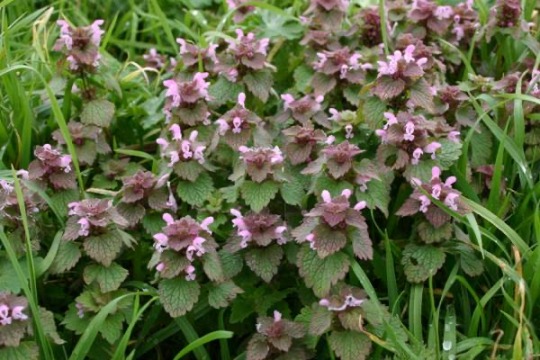
This is Lamium purpureum, also called Purple Deadnettle.
It's called deadnettle because it looks like a nettle but it doesn't sting you
This plant is a winter annual—it grows its leaves in the fall, lasts through the winter, and blooms and dies in the spring
Its pollen is reddish orange. If you see bees with their heads stained reddish orange, it is likely because they have visited Purple Deadnettle
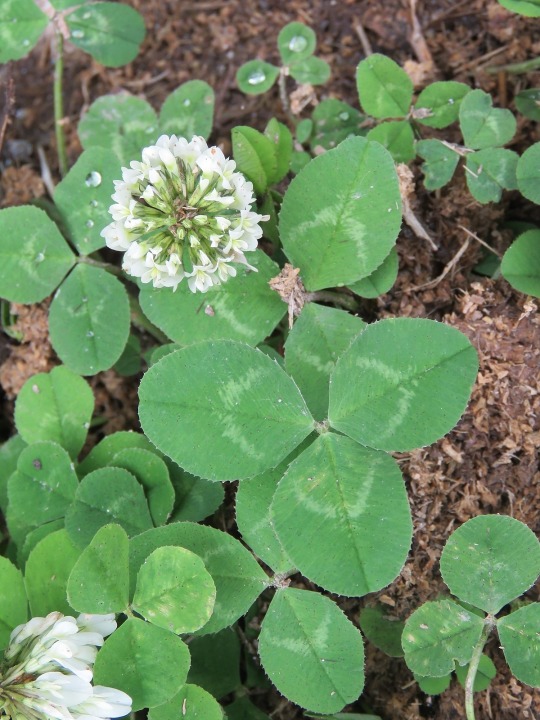
This is Trifolium repens, white clover
It is a legume (belongs to the bean family) and fixes nitrogen using symbiosis with bacteria that live in little nodules on its roots, fertilizing the soil
It is a good companion plant for the other members of a lawn or garden since it is tough, adaptable, and improves soil quality. According to my professor it used to be in lawn mixes, until chemical companies wanted to sell a new herbicide that would kill broadleaved plants and spare grass, and it was slandered as a weed :(
It is native only to Europe and Central Asia, but in the lawns they are doing more good than harm most places
Honeybees love to visit clover
Four-leaf clovers are said to be lucky
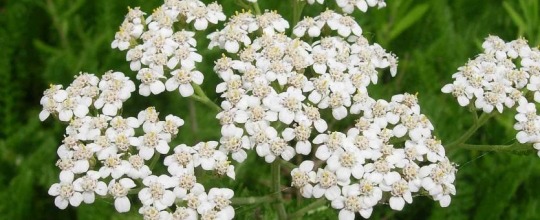
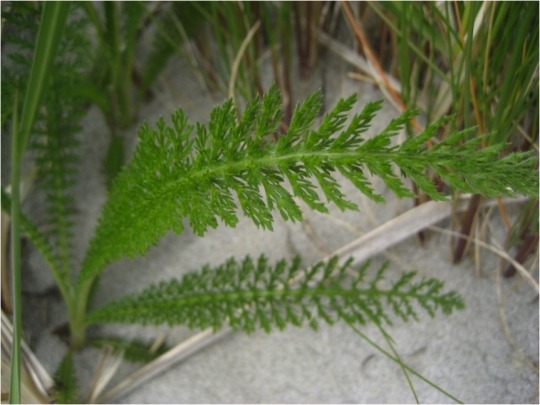
This is Achillea millefolium, Common Yarrow
It has had a relationship with humans since Neanderthals were around, at least 60,000 years, since Neanderthals have been found buried with Yarrow
Its leaves have been used to stop bleeding throughout history, and its scientific name comes from how Achilles was said to have used Yarrow to stop the blood from the wounds of his soldiers. A leaf rolled into a ball has been used to stop nosebleeds
It is a native species all throughout Eurasia and North America

This is Cichorium intybus, known as Chicory
The leaves look a lot like dandelion leaves, until in mid-spring when it begins growing a woody green stem straight up into the air
Like many other weeds, it has a symbiotic relationship with humans, existing in a mix of domesticated or partially domesticated and wild populations
It is native to Eurasia, but widespread in North America on roadsides and disturbed places, where it descended from cultivated plants
Its root contains large amounts of inulin, which is used as a sweetener and fiber supplement (if you look at the ingredients on the granola bars that have extra fiber, they usually are partly made of chicory root) and has also been used as a coffee substitute
A large variety of bees like to feed upon it

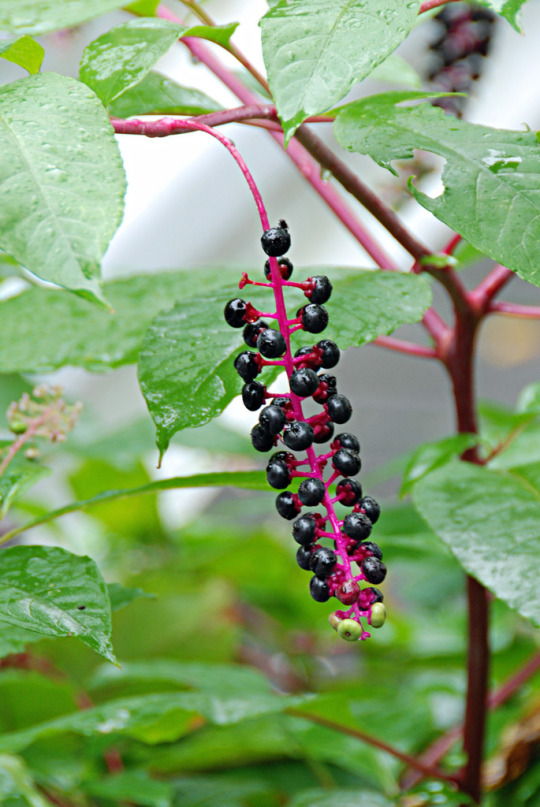
This is Phytolacca americana, known as Pokeweed
It is easily identified by its huge leaves and its waxy, bright magenta stem
It can grow more than nine feet tall from a sprout in a single summer!
If you squish the berries, the juice inside is a shocking magenta that is so bright it almost burns your eyes. For this reason many Native American people used it for pink and purple dye.
It is a heavy metal hyperaccumulator, particularly good for removing cadmium from the soil
All parts of the plant are poisonous and will make you very sick if you eat them, however if the leaves are picked when very young and boiled 3 times, changing out the water each time, they can be eaten, and this is a traditional food in the rural American Southeast, but I don't want to chance it
British people have introduced it as a pretty, exotic ornamental plant. I think that is very funny considering that here it is a weed associated with places where poor people live, but maybe they're right and I need to look closer to see the beauty.
If you see magenta stains in bird poop it is because they ate pokeweed berries- birds can safely eat the berries whereas humans cannot

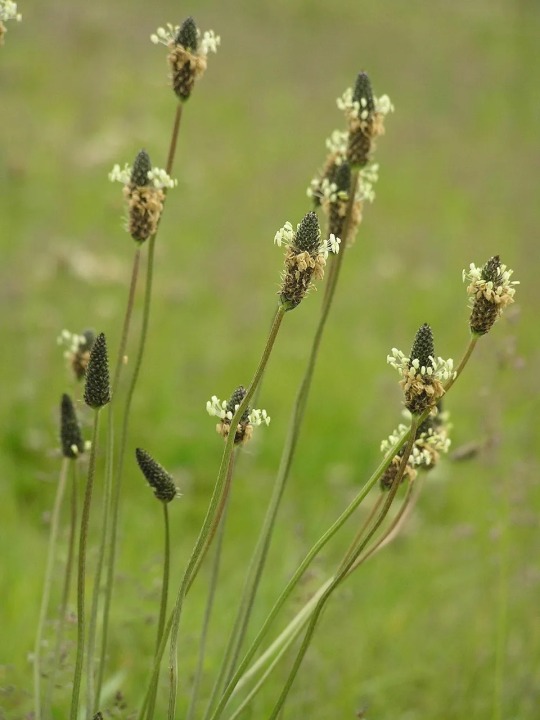
This is Plantago lanceolata, Ribwort Plantain
It grows in heavily disturbed soils, in fact it is considered an indicator of agricultural activity. It is successful in the poorest, heaviest and most compacted soil.
The leaves, seeds, and flower heads are said to be edible but the leaves are really stringy unless they are very young. Of course, it is important to be careful when eating wild plants, and make sure you have identified the plant correctly and the soil is not contaminated
I have also heard the strings in the leaves can be extracted and used for textile purposes
and that's some common plants you might often see throughout the world
#just remembered i had this in my drafts#i forget why i didn't post it immediately#anyway#plants#the ways of the plants
5K notes
·
View notes
Text
i think im gonna watch some videos about like. imperial chinese harems tonight because i deserve it.
#if i create a court drama story please kill me. i have too many stories to be doing that#and next stop will probably be videos on hanbok. i have many things i want to study...#and once i get through some of the major east asian things on my list? probably southeast asia and the middle east and such.#east asia is just the most accessible rn information wise which is why im starting there
0 notes
Text
Peace-building through Art: Cultural Initiatives in Southeast Asia’s War-affected Regions
by Emancip8 Project

Promoting peace in war-torn regions is an intricate and multifaceted endeavor. Southeast Asia’s history of conflict presents unique challenges to peace-building practitioners. One innovative approach that has gained traction in recent years is the utilization of cultural initiatives and artistic expression to foster dialogue, healing, and social cohesion. This article examines the impact of art in peace-building efforts across Southeast Asia’s conflict-affected areas, highlighting the transformative power of creative expression in building lasting peace.
Cultural initiatives play a crucial role in addressing the deep-rooted grievances and traumas that arise from armed conflict (Cohen, 2005). Art, as a non-threatening medium, can enable individuals to explore and express complex emotions, fostering empathy and understanding between different groups (Lederach, 2005). In Cambodia, for example, the Amrita Performing Arts organization has developed contemporary dance performances to engage local communities in dialogue about the country’s violent past, while also preserving traditional art forms (Amrita Performing Arts, 2014).
Moreover, artistic expression can provide a platform for marginalized voices, empowering individuals to advocate for peace and social change (Boydell et al., 2014). In the Philippines, the Mindanao Peacebuilding Institute Foundation (MPI) has implemented community theater projects that enable Muslim, Christian, and indigenous communities to share their stories and perspectives, fostering mutual understanding and respect (MPI, 2017).
Art-based peace-building initiatives also contribute to psychosocial healing in post-conflict societies (Van der Brug & Verduin, 2012). The power of art to facilitate emotional expression and catharsis is particularly significant in communities affected by trauma, as it can help individuals process and make sense of their experiences. In Indonesia, for instance, the Center for Survivors of Violence and Torture has used art therapy to support survivors in their recovery process, promoting personal healing and reconciliation (Van der Brug & Verduin, 2012).
Furthermore, cultural initiatives can contribute to the development of social capital, promoting resilience and cohesion within communities (Kaplan, 2009). In Myanmar, the Turning Tables project has provided youth with music production and storytelling skills, enabling them to express their hopes and aspirations for peace while strengthening community bonds (Turning Tables, 2018).
Lastly, art can serve as a medium for peace education, promoting values of tolerance, nonviolence, and mutual respect (Boulding, 2000). In Thailand’s Deep South, the Patani Arts Space initiative has engaged local youth in art workshops and exhibitions, fostering a culture of peace through creative expression and dialogue (Patani Arts Space, 2016).
In conclusion, art and cultural initiatives offer a valuable and transformative approach to peace-building in Southeast Asia’s war-affected regions. By engaging communities in dialogue, empowering marginalized voices, facilitating healing, and promoting social cohesion, these initiatives contribute to building sustainable peace in the region.
References:
Amrita Performing Arts. (2014). About Us. Sourced from https://www.amritaperformingarts.org
Boulding, E. (2000). Cultures of Peace: The Hidden Side of History. Syracuse, NY: Syracuse University Press.
Boydell, K. M., Gladstone, B. M., & Volpe, T. (2014). Producing and Using Youth Mental Health Knowledge in Art Spaces. Qualitative Research in Psychology, 11(1), 102–119.
Cohen, C. (2005). Engaging with the Arts to Promote Coexistence. In M. Fitzduff & C. E. Stout (Eds.), The Psychology of Resolving Global Conflicts: From War to Peace (pp. 265–294). Westport, CT: Praeger Security International.
Kaplan, I. (2009). Social Capital, Conflict, and War. Journal of Conflict Resolution, 53(3), 447–467.
Lederach, J. P. (2005). The Moral Imagination: The Art and Soul of Building Peace. Oxford, UK: Oxford University Press.
Mindanao Peacebuilding Institute Foundation (MPI). (2017). Annual Report 2017. Sourced from https://www.mpiasia.net
Patani Arts Space. (2016). Our Programs. Sourced from https://www.pataniartsspace.org
Turning Tables. (2018). Turning Tables Myanmar. Sourced from https://www.turningtables.org/myanmar
Van der Brug, K., & Verduin, F. (2012). Psychosocial Interventions in Post-Conflict Settings: The Role of Art in Peacebuilding. In M. J. D. Jordans & K. E. Miller (Eds.), Mental Health in Armed Conflict: The Role of NGOs (pp. 63–74). New York, NY: Palgrave Macmillan.
Read more at Emancip8 Project.
#Southeast Asia conflict regions#Art and reconciliation#Post-conflict creative expression#Emancip8 Project#Cultural initiatives war-affected areas#Peace-building through art
1 note
·
View note
Text
Good News - June 15-21
Like these weekly compilations? Tip me at $Kaybarr1735! And if you tip me and give me a way to contact you, at the end of the month I'll send you a link to all of the articles I found but didn't use each week!
1. Victory for Same-Sex Marriage in Thailand
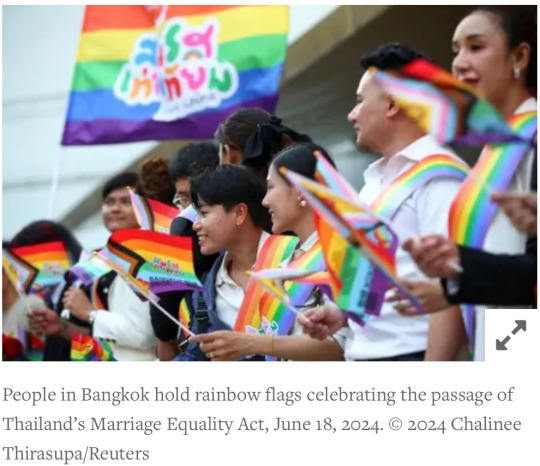
“Thailand’s Senate voted 130-4 today to pass a same-sex marriage bill that the lower house had approved by an overwhelming majority in March. This makes Thailand the first country in Southeast Asia, and the second in Asia, to recognize same-sex relationships. […] The Thai Marriage Equality Act […] will come into force 120 days after publication in the Royal Gazette. It will stand as an example of LGBT rights progress across the Asia-Pacific region and the world.”
2. One of world’s rarest cats no longer endangered
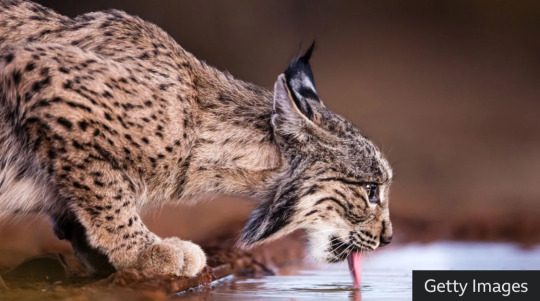
“[The Iberian lynx’s] population grew from 62 mature individuals in 2001 to 648 in 2022. While young and mature lynx combined now have an estimated population of more than 2,000, the IUCN reports. The increase is largely thanks to conservation efforts that have focused on increasing the abundance of its main food source - the also endangered wild rabbit, known as European rabbit. Programmes to free hundreds of captive lynxes and restoring scrublands and forests have also played an important role in ensuring the lynx is no longer endangered.”
3. Planning parenthood for incarcerated men
“[M]any incarcerated young men missed [sex-ed] classroom lessons due to truancy or incarceration. Their lack of knowledge about sexual health puts them at a lifelong disadvantage. De La Cruz [a health educator] will guide [incarcerated youths] in lessons about anatomy and pregnancy, birth control and sexually transmitted infections. He also explores healthy relationships and the pitfalls of toxic masculinity. […] Workshops cover healthy relationships, gender and sexuality, and sex trafficking.”
4. Peru puts endemic fog oasis under protection
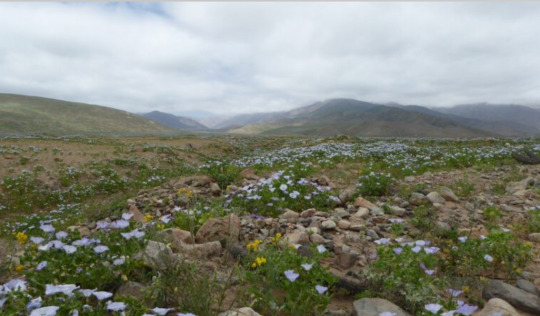
“Lomas are unique ecosystems relying on marine fog that host rare and endemic plants and animal species. […] The Peruvian government has formally granted conservation status to the 6,449-hectare (16,000-acre) desert oasis site[….] The site, the first of its kind to become protected after more than 15 years of scientific and advocacy efforts, will help scientists understand climatic and marine cycles in the area[, … and] will be protected for future research and exploration for at least three decades.”
5. Religious groups are protecting Pride events — upending the LGBTQ+ vs. faith narrative
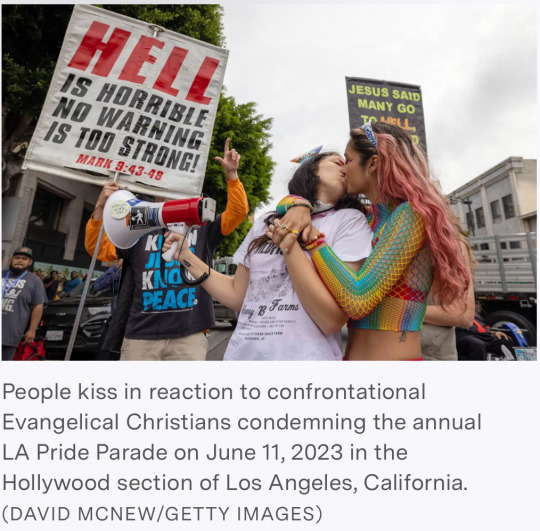
“In some cases, de-escalation teams stand as a physical barrier between protesters and event attendees. In other instances, they try to talk with protesters. The goal is generally to keep everyone safe. Leigh was learning that sometimes this didn’t mean acting as security, but doing actual outreach. That might mean making time and space to listen to hate speech. It might mean offering food or water. […] After undergoing Zoom trainings this spring, the members of some 120 faith organizations will fan out across more than 50 Pride events in 16 states to de-escalate the actions of extremist anti-LGBTQ+ hate groups.”
6. 25 years of research shows how to restore damaged rainforest
“For the first time, results from 25 years of work to rehabilitate fire-damaged and heavily logged rainforest are now being presented. The study fills a knowledge gap about the long-term effects of restoration and may become an important guide for future efforts to restore damaged ecosystems.”
7. Audubon and Grassroots Carbon Announce First-of-its-Kind Partnership to Reward Landowners for Improving Habitats for Birds while Building Healthy Soils
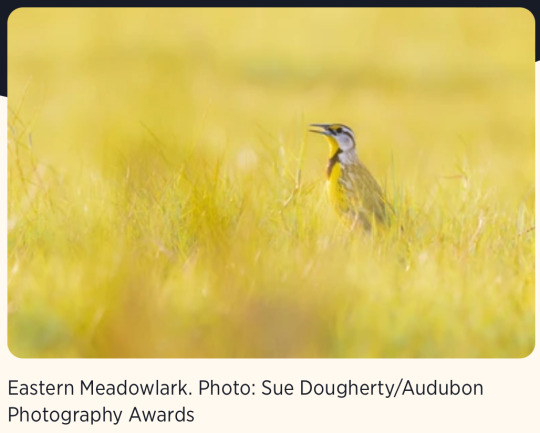
“Participating landowners can profit from additional soil carbon storage created through their regenerative land management practices. These practices restore grasslands, improve bird habits, build soil health and drive nature-based soil organic carbon drawdown through the healthy soils of farms and ranches. […] Additionally, regenerative land management practices improve habitats for birds. […] This partnership exemplifies how sustainable practices can drive positive environmental change while providing tangible economic benefits for landowners.”
8. Circular food systems found to dramatically reduce greenhouse gas emissions, require much less agricultural land
“Redesigning the European food system will reduce agricultural land by 44% while dramatically reducing greenhouse gas emissions from agriculture by 70%. This reduction is possible with the current consumption of animal protein. “Moreover, animals are recyclers in the system. They can recycle nutrients from human-inedible parts of the organic waste and by-products in the food system and convert them to valuable animal products," Simon says.”
9. Could Treating Injured Raptors Help Lift a Population? Researchers found the work of rehabbers can have long-lasting benefits
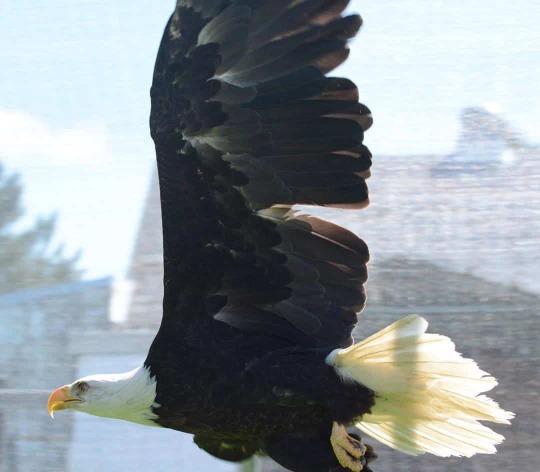
“[“Wildlife professionals”] tend to have a dismissive attitude toward addressing individual animal welfare,” [… but f]or most raptor species, they found, birds released after rehabilitation were about as likely to survive as wild birds. Those released birds can have even broader impacts on the population. Back in the wild, the birds mate and breed, raising hatchlings that grow up to mate and breed, too. When the researchers modeled the effects, they found most species would see at least some population-level benefits from returning raptors to the wild.”
10. Indigenous people in the Amazon are helping to build bridges & save primates
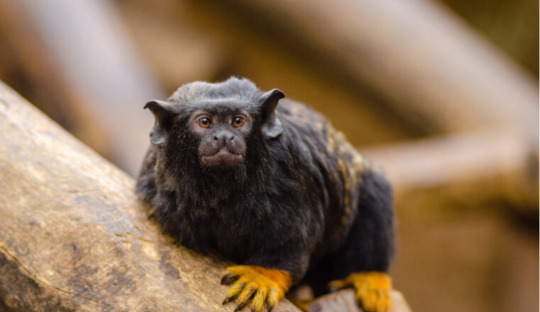
“Working together, the Reconecta Project and the Waimiri-Atroari Indigenous people build bridges that connect the forest canopy over the BR-174 road[….] In the first 10 months of monitoring, eight different species were documented — not only monkeys such as the golden-handed tamarin and the common squirrel monkey (Saimiri sciureus), but also kinkajous (Potos flavus), mouse opossums (Marmosops sp.), and opossums (Didelphis sp.).”
Bonus: A rare maneless zebra was born in the UK
June 8-14 news here | (all credit for images and written material can be found at the source linked; I don’t claim credit for anything but curating.)
#hopepunk#good news#lgbtq#gay rights#gay marriage#same sex marriage#thailand#lynx#big cats#cats#endangered species#endangered#sex education#prison#peru#conservation#habitat#religion#pride#faith#pride month#lgbt pride#compassion#rainforest#birds#nature#climate change#wildlife rehab#wildlife#indigenous
1K notes
·
View notes
Text
TUK TUK FOR TOURISMTuk-tuks are a popular mode of transportation for tourists in many countries, particularly in Southeast Asia. They are often used for city tours, as they are small and maneuverable and can navigate through traffic and tight streets easily.WHAT IS TUK TUK ?
TUK TUK FOR TOURISM
TUK TUK LISBON TOUR
TUK TUK BANGOR RESTAURANT
Are TUK TUK legal in UK ?
TUK TUK THAI
TUK TUK PETROL
Kansas City Twice Baked Potatoes perfect spongebob popsicle deformed spongebob popsicle
#TUK TUK FOR TOURISMTuk-tuks are a popular mode of transportation for tourists in many countries#particularly in Southeast Asia. They are often used for city tours#as they are small and maneuverable and can navigate through traffic and tight streets easily.WHAT IS TUK TUK ?#TUK TUK FOR TOURISM#TUK TUK LISBON TOUR#TUK TUK BANGOR RESTAURANT#Are TUK TUK legal in UK ?#TUK TUK THAI#TUK TUK PETROL#Kansas City Twice Baked Potatoes perfect spongebob popsicle deformed spongebob popsicle
0 notes
Text
TUK TUK FOR TOURISMTuk-tuks are a popular mode of transportation for tourists in many countries, particularly in Southeast Asia. They are often used for city tours, as they are small and maneuverable and can navigate through traffic and tight streets easily.WHAT IS TUK TUK ?
TUK TUK FOR TOURISM
TUK TUK LISBON TOUR
TUK TUK BANGOR RESTAURANT
Are TUK TUK legal in UK ?
TUK TUK THAI
TUK TUK PETROL
Kansas City Twice Baked Potatoes perfect spongebob popsicle deformed spongebob popsicle
#TUK TUK FOR TOURISMTuk-tuks are a popular mode of transportation for tourists in many countries#particularly in Southeast Asia. They are often used for city tours#as they are small and maneuverable and can navigate through traffic and tight streets easily.WHAT IS TUK TUK ?#TUK TUK FOR TOURISM#TUK TUK LISBON TOUR#TUK TUK BANGOR RESTAURANT#Are TUK TUK legal in UK ?#TUK TUK THAI#TUK TUK PETROL#Kansas City Twice Baked Potatoes perfect spongebob popsicle deformed spongebob popsicle
0 notes
Text
TUK TUK FOR TOURISMTuk-tuks are a popular mode of transportation for tourists in many countries, particularly in Southeast Asia. They are often used for city tours, as they are small and maneuverable and can navigate through traffic and tight streets easily.WHAT IS TUK TUK ?
TUK TUK FOR TOURISM
TUK TUK LISBON TOUR
TUK TUK BANGOR RESTAURANT
Are TUK TUK legal in UK ?
TUK TUK THAI
TUK TUK PETROL
Kansas City Twice Baked Potatoes perfect spongebob popsicle deformed spongebob popsicle
#TUK TUK FOR TOURISMTuk-tuks are a popular mode of transportation for tourists in many countries#particularly in Southeast Asia. They are often used for city tours#as they are small and maneuverable and can navigate through traffic and tight streets easily.WHAT IS TUK TUK ?#TUK TUK FOR TOURISM#TUK TUK LISBON TOUR#TUK TUK BANGOR RESTAURANT#Are TUK TUK legal in UK ?#TUK TUK THAI#TUK TUK PETROL#Kansas City Twice Baked Potatoes perfect spongebob popsicle deformed spongebob popsicle
1 note
·
View note
Text
TUK TUK FOR TOURISMTuk-tuks are a popular mode of transportation for tourists in many countries, particularly in Southeast Asia. They are often used for city tours, as they are small and maneuverable and can navigate through traffic and tight streets easily.WHAT IS TUK TUK ?
TUK TUK FOR TOURISM
TUK TUK LISBON TOUR
TUK TUK BANGOR RESTAURANT
Are TUK TUK legal in UK ?
TUK TUK THAI
TUK TUK PETROL
Kansas City Twice Baked Potatoes perfect spongebob popsicle deformed spongebob popsicle
#TUK TUK FOR TOURISMTuk-tuks are a popular mode of transportation for tourists in many countries#particularly in Southeast Asia. They are often used for city tours#as they are small and maneuverable and can navigate through traffic and tight streets easily.WHAT IS TUK TUK ?#TUK TUK FOR TOURISM#TUK TUK LISBON TOUR#TUK TUK BANGOR RESTAURANT#Are TUK TUK legal in UK ?#TUK TUK THAI#TUK TUK PETROL#Kansas City Twice Baked Potatoes perfect spongebob popsicle deformed spongebob popsicle
0 notes
Text
TUK TUK FOR TOURISMTuk-tuks are a popular mode of transportation for tourists in many countries, particularly in Southeast Asia. They are often used for city tours, as they are small and maneuverable and can navigate through traffic and tight streets easily.WHAT IS TUK TUK ?
TUK TUK FOR TOURISM
TUK TUK LISBON TOUR
TUK TUK BANGOR RESTAURANT
Are TUK TUK legal in UK ?
TUK TUK THAI
TUK TUK PETROL
Kansas City Twice Baked Potatoes perfect spongebob popsicle deformed spongebob popsicle
#TUK TUK FOR TOURISMTuk-tuks are a popular mode of transportation for tourists in many countries#particularly in Southeast Asia. They are often used for city tours#as they are small and maneuverable and can navigate through traffic and tight streets easily.WHAT IS TUK TUK ?#TUK TUK FOR TOURISM#TUK TUK LISBON TOUR#TUK TUK BANGOR RESTAURANT#Are TUK TUK legal in UK ?#TUK TUK THAI#TUK TUK PETROL#Kansas City Twice Baked Potatoes perfect spongebob popsicle deformed spongebob popsicle
1 note
·
View note
Text
TUK TUK FOR TOURISMTuk-tuks are a popular mode of transportation for tourists in many countries, particularly in Southeast Asia. They are often used for city tours, as they are small and maneuverable and can navigate through traffic and tight streets easily.WHAT IS TUK TUK ?
TUK TUK FOR TOURISM
TUK TUK LISBON TOUR
TUK TUK BANGOR RESTAURANT
Are TUK TUK legal in UK ?
TUK TUK THAI
TUK TUK PETROL
Kansas City Twice Baked Potatoes perfect spongebob popsicle deformed spongebob popsicle
#TUK TUK FOR TOURISMTuk-tuks are a popular mode of transportation for tourists in many countries#particularly in Southeast Asia. They are often used for city tours#as they are small and maneuverable and can navigate through traffic and tight streets easily.WHAT IS TUK TUK ?#TUK TUK FOR TOURISM#TUK TUK LISBON TOUR#TUK TUK BANGOR RESTAURANT#Are TUK TUK legal in UK ?#TUK TUK THAI#TUK TUK PETROL#Kansas City Twice Baked Potatoes perfect spongebob popsicle deformed spongebob popsicle
0 notes
Text
TUK TUK FOR TOURISMTuk-tuks are a popular mode of transportation for tourists in many countries, particularly in Southeast Asia. They are often used for city tours, as they are small and maneuverable and can navigate through traffic and tight streets easily.WHAT IS TUK TUK ?
TUK TUK FOR TOURISM
TUK TUK LISBON TOUR
TUK TUK BANGOR RESTAURANT
Are TUK TUK legal in UK ?
TUK TUK THAI
TUK TUK PETROL
Kansas City Twice Baked Potatoes perfect spongebob popsicle deformed spongebob popsicle
#TUK TUK FOR TOURISMTuk-tuks are a popular mode of transportation for tourists in many countries#particularly in Southeast Asia. They are often used for city tours#as they are small and maneuverable and can navigate through traffic and tight streets easily.WHAT IS TUK TUK ?#TUK TUK FOR TOURISM#TUK TUK LISBON TOUR#TUK TUK BANGOR RESTAURANT#Are TUK TUK legal in UK ?#TUK TUK THAI#TUK TUK PETROL#Kansas City Twice Baked Potatoes perfect spongebob popsicle deformed spongebob popsicle
0 notes
Text
TUK TUK FOR TOURISMTuk-tuks are a popular mode of transportation for tourists in many countries, particularly in Southeast Asia. They are often used for city tours, as they are small and maneuverable and can navigate through traffic and tight streets easily.WHAT IS TUK TUK ?
TUK TUK FOR TOURISM
TUK TUK LISBON TOUR
TUK TUK BANGOR RESTAURANT
Are TUK TUK legal in UK ?
TUK TUK THAI
TUK TUK PETROL
Kansas City Twice Baked Potatoes perfect spongebob popsicle deformed spongebob popsicle
#TUK TUK FOR TOURISMTuk-tuks are a popular mode of transportation for tourists in many countries#particularly in Southeast Asia. They are often used for city tours#as they are small and maneuverable and can navigate through traffic and tight streets easily.WHAT IS TUK TUK ?#TUK TUK FOR TOURISM#TUK TUK LISBON TOUR#TUK TUK BANGOR RESTAURANT#Are TUK TUK legal in UK ?#TUK TUK THAI#TUK TUK PETROL#Kansas City Twice Baked Potatoes perfect spongebob popsicle deformed spongebob popsicle
0 notes
Text
TUK TUK FOR TOURISMTuk-tuks are a popular mode of transportation for tourists in many countries, particularly in Southeast Asia. They are often used for city tours, as they are small and maneuverable and can navigate through traffic and tight streets easily.WHAT IS TUK TUK ?
TUK TUK FOR TOURISM
TUK TUK LISBON TOUR
TUK TUK BANGOR RESTAURANT
Are TUK TUK legal in UK ?
TUK TUK THAI
TUK TUK PETROL
Kansas City Twice Baked Potatoes perfect spongebob popsicle deformed spongebob popsicle
#TUK TUK FOR TOURISMTuk-tuks are a popular mode of transportation for tourists in many countries#particularly in Southeast Asia. They are often used for city tours#as they are small and maneuverable and can navigate through traffic and tight streets easily.WHAT IS TUK TUK ?#TUK TUK FOR TOURISM#TUK TUK LISBON TOUR#TUK TUK BANGOR RESTAURANT#Are TUK TUK legal in UK ?#TUK TUK THAI#TUK TUK PETROL#Kansas City Twice Baked Potatoes perfect spongebob popsicle deformed spongebob popsicle
0 notes